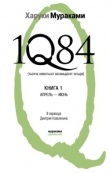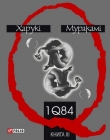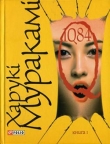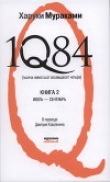
Текст книги "1q84"
Автор книги: Haruki Murakami
Жанр:
Современная проза
сообщить о нарушении
Текущая страница: 51 (всего у книги 81 страниц)
Then it suddenly hit him: This is an air chrysalis!
This was the first time that Tengo had ever seen an air chrysalis. He had described some in great detail in the novella, but of course he had never seen a real one with his own eyes, and he had never thought of them as things that actually existed. But what he saw before him now was the very object his mind had imagined and his words had described: an air chrysalis. He experienced such a violent sense of déjà vu that it felt as if a metal band had been tightened around his stomach. Nevertheless, he stepped inside the room and closed the door. Better not let anyone see him. He swallowed the saliva that had been collecting in his mouth, making a strange sound in his throat.
Tengo crept toward the bed, stopping when there was no more than a yard between him and it, examining the air chrysalis in greater detail. Now he could be sure that it looked exactly like the picture he had drawn of an air chrysalis at the time he wrote the story. He had done a simple pencil sketch before attempting to create a description of an air chrysalis, first putting the image in his mind into visual form and then transferring it into words. He had left the picture pinned to the wall over his desk while he rewrote Air Chrysalis. It was shaped more like a cocoon than a chrysalis, but “air chrysalis” was the only name by which Fuka-Eri (and Tengo himself) could possibly call the thing.
During his revision, Tengo had created most of the external features of an air chrysalis and added them to his descriptions, including the gracefully narrowed waist in the middle and the swelling, round, decorative protuberance at either end. These came entirely from Tengo’s mind. There had been no mention of them in Fuka-Eri’s original narrative. To Fuka-Eri, an air chrysalis was simply that—an air chrysalis, something midway between an object and a concept—and she seemed to feel little need to describe its appearance in words. Tengo had to invent all the details himself, and the air chrysalis that he was now seeing had these same details exactly: the waist in the middle and the lovely protuberances at either end.
This is the very air chrysalis I sketched and described, Tengo thought. The same thing happened with the two moons. For some reason, every detail he had put into writing had now become a reality. Cause and effect were jumbled together.
All four of Tengo’s limbs felt a strange, nervous, twisting sensation, and his flesh began to crawl. He could no longer distinguish how much of this present world was reality and how much of it fiction. How much of it belonged to Fuka-Eri, how much was Tengo’s, and how much was “ours”?
A small tear had opened at the very top of the air chrysalis: the chrysalis was about to break in two. The gap that had formed was perhaps an inch long. If he bent over and brought his eye to the opening, he could probably see what was inside. But Tengo could not find the courage to do so. He sat down on the stool by the bed, staring at the air chrysalis while his shoulders rose and fell imperceptibly as he struggled to bring his breathing under control. The white chrysalis lay there still, emitting its faint glow, quietly waiting, like a mathematical proposition, for Tengo to approach it.
What could possibly be inside the chrysalis?
What was it trying to show him?
In the novella Air Chrysalis, the young girl protagonist discovers her own other self inside. Her dohta. She leaves her dohta behind and runs away from the community alone. But what could possibly be inside of Tengo’s air chrysalis? (Tengo felt intuitively that this air chrysalis must be his own.) Was it something good or something evil? Was it something that would guide him somewhere or something that would stand in his way? And who could possibly have sent this air chrysalis to him here?
Tengo knew quite well that he was being asked to act. But he could not find the courage that would enable him to stand and look inside the chrysalis. He was afraid. The thing inside the chrysalis might wound him or greatly change his life. The thought caused Tengo to grow stiff, sitting on the little stool like someone who has lost a place of refuge. He was feeling the same kind of fear that had kept him from looking up his parents’ family register or searching for Aomame. He did not want to know what was inside the air chrysalis that had been prepared for him. If he could get by without knowing what was in there, that was how he wanted to walk out of this room. If possible, he wanted to leave this room now, get on the train, and go back to Tokyo. He wanted to close his eyes, block his ears, and burrow himself in his own little world.
But Tengo also knew that this was impossible. If I leave here without seeing what is inside, I’ll regret it for the rest of my life. I’ll probably never be able to forgive myself for having averted my eyes from that something, whatever it might be.
Tengo remained seated on the stool for a long time, unsure of what he should do, unable to go either forward or back. Folding his hands on his knees, he stared at the air chrysalis on the bed, glancing occasionally out the window, as if hoping to escape. The sun had set, and a pale afterglow was slowly enveloping the pine woods. Still there was no wind, nor could he hear the sound of the waves. It was almost mysteriously quiet. And as the room’s darkness increased, the light emitted by the white object became deeper and more vivid. The chrysalis itself seemed like a living thing to Tengo, with its soft glow of life, its unique warmth, its nearly imperceptible vibration.
Finally Tengo made up his mind, stood up from the stool, and leaned over the bed. Running away now was out of the question. He couldn’t live forever like a frightened child, averting his eyes from the things before him. Only by learning the truth—whatever that truth might be—could people be given the right kind of power.
The tear in the air chrysalis was unchanged, neither bigger nor smaller than before. Squinting, he looked in through the opening, but he could not see very far inside. It was dark in there, and a thin membrane seemed to be stretched across the space inside. Tengo steadied his breathing and made sure his hands were not shaking. Then he put his fingers into the inch-long opening and slowly spread it apart, as if opening the two leaves of a double sliding door. It opened easily with little resistance and no sound, as if it had been waiting for his hands.
Now the light of the air chrysalis itself was softly illuminating its interior, like light reflected from snow. He was able to see inside, however dimly.
What Tengo found in there was a beautiful ten-year-old girl.
She was sound asleep. She wore a simple white dress or nightgown free of decoration, her small hands folded on top of her flat chest. Tengo knew instantly who this was. She had a slender face, and her lips formed a straight line, as if drawn with a ruler. Perfectly straight bangs lay over a smooth, well-shaped forehead. Her little nose seemed to be searching for something, aimed tentatively upward into space. Her cheekbones stretched slightly to either side. Her eyes were closed, but Tengo knew what they would look like when they opened. How could he not know? He had lived for twenty years holding the image of this girl in his heart.
“Aomame,” Tengo said aloud.
The girl was sound asleep—a deep and utterly natural sleep, with the faintest possible breathing. The beating of her heart was too ephemeral to be heard. She did not have enough strength to raise her eyelids. The time for that had not come yet. Her conscious mind was not here but rather somewhere far away. Still, the word that Tengo had spoken was able to impart the slightest vibration to her eardrums. It was her name.
Aomame heard the call from far away. Tengo, she thought. She formed the word clearly with her mouth, though it didn’t move the lips of the girl in the air chrysalis or reach Tengo’s ears.
As if his soul had been snatched, Tengo stared insatiably at the girl, taking one shallow breath after another. Her face looked totally peaceful, without the slightest shadow of sadness or pain or anxiety. Her thin, little lips seemed ready to begin moving at any moment to form meaningful words. Her eyelids appeared ready to open. Tengo prayed from the heart for this to happen. His prayer took no precise words, but his heart spun this formless prayer and sent it out into space. The girl, however, showed no sign of waking.
“Aomame,” Tengo called again.
There were things he had to say to Aomame, feelings he had to convey to her. He had been living with them, keeping them inside, for years. But all that Tengo could do now was speak her name.
“Aomame,” he called.
He dared then to reach out and touch the hand of the girl who lay in the air chrysalis, placing his big grown-up hand on hers. This was the little hand that had so tightly grasped the hand of his ten-year-old self. This hand had come straight for him, wanting him, giving him encouragement. The unmistakable warmth of life was there in the hand of the girl asleep inside the pale glow. Aomame came here to convey her warmth to me, Tengo thought. That was the meaning of the package she handed to me in that classroom twenty years ago. Now at last he was able to open the package and view its contents.
“Aomame,” Tengo said. “I will find you, no matter what.”
After the air chrysalis had gradually lost its glow and disappeared, as if sucked into the darkness, and the young Aomame had disappeared as well, Tengo found himself unable to judge whether all of this had really happened. But his fingers retained the touch and the intimate warmth of her little hand.
This warmth will almost surely never fade, Tengo thought, sitting aboard the special express train heading for Tokyo. Tengo had lived for the past twenty years with the memory of her touch. He should be able to go on living with this new warmth.
The express train traced a huge arc along the ocean shore beneath the towering mountains, until it reached a point along the coast where the two moons were visible, hanging side by side in the sky above the quiet sea. They stood out sharply—the big, yellow moon and the small, green one—vivid in outline but their distance impossible to grasp. In their light, the ocean’s tiny ripples shone mysteriously like scattered shards of glass. As the train continued around the curve, the two moons moved slowly across the window, leaving those delicate shards behind, like wordless hints, until they disappeared from view.
Once the moons were gone, the warmth returned to Tengo’s chest. Faint as it was, the warmth was surely there, conveying a promise like a lamp a traveler sees in the far distance.
I will go on living in this world, Tengo thought, closing his eyes. He did not know yet how this world was put together or under what principles it moved, and he had no way of predicting what would happen there. But that was all right. He didn’t have to be afraid. Whatever might be waiting for him, he would survive in this world with two moons, and he would find the path he needed to take—as long as he did not forget this warmth, as long as he did not lose this feeling in his heart.
He kept his eyes closed like this for a long time. Eventually, he opened his eyes to stare into the darkness of the early-autumn night beyond the window. The ocean had long since disappeared.
I will find Aomame, Tengo swore to himself again, no matter what happens, no matter what kind of world it may be, no matter who she may be.

BOOK 3 OCTOBER-DECEMBER

CHAPTER 1
Ushikawa
SOMETHING KICKING
AT THE FAR EDGES OF CONSCIOUSNESS
“I wonder if you would mind not smoking, Mr. Ushikawa,” the shorter man said.
Ushikawa gazed steadily at the man seated across the desk from him, then down at the Seven Stars cigarette between his fingers. He hadn’t lit it yet.
“I’d really appreciate it,” the man added politely.
Ushikawa looked puzzled, as if he were wondering how such an object possibly found its way into his hand.
“Sorry about that,” he said. “I won’t light up. I just took it out without thinking.”
The man’s chin moved up and down, perhaps a half inch, but his gaze didn’t waver. His eyes remained fixed on Ushikawa’s. Ushikawa stuck the cigarette back in its box, the box in a drawer.
The taller of the two men, the one with a ponytail, stood in the doorway, leaning so lightly against the door frame that it was hard to tell if he was actually touching it. He stared at Ushikawa as if he were a stain on the wall. What a creepy pair, Ushikawa thought. This was the third time he had met with these men, and they made him uneasy every time.
Ushikawa’s cramped office had a single desk, and the shorter of the two men, the one with a buzz cut, sat across from him. He was the one who did the talking. Ponytail didn’t say a word. Like one of those stone guardian dogs at the entrance to a Shinto shrine, he stood stock-still, not moving an inch, watching Ushikawa.
“It has been three weeks,” Buzzcut noted.
Ushikawa picked up his desk calendar, checked what was written on it, and nodded. “Correct. It has been exactly three weeks since we last met.”
“And in the meantime you haven’t reported to us even once. As I’ve mentioned before, Mr. Ushikawa, every moment is precious. We have no time to waste.”
“I completely understand,” Ushikawa replied, fiddling with his gold lighter in place of the cigarette. “There’s no time to waste. I am well aware of this.”
Buzzcut waited for Ushikawa to go on.
“The thing is,” Ushikawa said, “I don’t like to talk in fits and starts. A little of this, a little of that. I would like to wait until I start to see the big picture and things begin to fall into place and I can see what’s behind all this. Half-baked ideas can only lead to trouble. I know this sounds selfish, but that’s the way I do things.”
Buzzcut gazed coolly at Ushikawa. Ushikawa knew the man didn’t think much of him, not that this really worried him much. As far as he could recall, no one had ever had a good impression of him. He was used to it. His parents and siblings had never liked him, and neither had his teachers or classmates. It was the same with his wife and children. If someone did like him, now then he would be concerned. But the other way around didn’t faze him.
“Mr. Ushikawa, we would like to respect your way of doing things. And I believe we have done that. So far. But things are different this time. I’m sorry to say we don’t have the luxury of waiting until we know all the facts.”
“I understand,” Ushikawa said, “but I doubt you’ve just been sitting back all this time waiting for me to get in touch. I suspect you’ve been running your own investigations?”
Buzzcut didn’t respond. His lips remained pressed in a tight horizontal line, and his expression didn’t give anything away. But Ushikawa could tell that he wasn’t far from the truth. Over the past three weeks, their organization had geared up, and, although they had probably used different tactics from Ushikawa, they had been searching for the woman. But they must not have found anything, which is why they had turned up again in Ushikawa’s office.
“It takes a thief to catch a thief,” Ushikawa said, spreading his hands wide, as if disclosing some fascinating secret. “Try to hide something, and this thief can sniff it out. I know I’m not the most pleasant-looking person, but I do have a nose for things. I can follow the faintest scent to the very end. Because I’m a thief myself. I have to do things my way, at my own pace. I completely understand that time is pressing, but I would like you to wait a little longer. You have to be patient, otherwise the whole thing may collapse.”
Ushikawa toyed with his lighter. Buzzcut’s eyes patiently followed Ushikawa’s movements, and then he looked up.
“I would appreciate it if you would tell me what you’ve found, even if it’s incomplete. Granted, you have your own way of doing things, but if I don’t take something concrete back to my superiors, we’ll be in a tough spot. I think you’re in a bit of a precarious situation yourself, Mr. Ushikawa.”
These guys really are up a creek, Ushikawa realized. The two of them were martial arts experts, which is why they were selected to be Leader’s bodyguards. Despite that, Leader had been murdered right under their noses. Not that there was actually any evidence that he had been murdered—several doctors in the religion had examined the body and found no external injuries. But medical equipment within the religion was rudimentary at best. And time was of the essence. If a thorough, legal autopsy had been performed by a trained pathologist, they might very well have discovered evidence of foul play, but it was too late now. The body had been secretly disposed of within the Sakigake compound.
At any rate, these two bodyguards had failed in their assignment to protect Leader, and their position in the religion was shaky. Their role now was to locate this woman, after she had seemingly vanished into thin air. The order was out: leave no stone unturned until they found her. But so far they had come up empty-handed. They were trained bodyguards, but when it came to finding missing persons, they lacked the right skills.
“I understand where you’re coming from,” Ushikawa replied. “And I will tell you some things I’ve discovered. Not the whole story, but I can reveal parts of it.”
Buzzcut sat there for a while, his eyes narrowed. And then he nodded. “That would be fine. We have uncovered a few details ourselves, things you may already be aware of, or perhaps not. We should share whatever information we have.”
Ushikawa put the lighter down and tented his fingers on top of the desk.
“The young woman, Aomame,” he began, “was asked to come to a suite at the Hotel Okura, and helped Leader to relax his muscles by working his body through a series of stretching exercises. This was at the beginning of September, on the evening of that tremendous thunderstorm. Aomame treated him for around an hour in a separate room, then left Leader while he slept. She told you to let him sleep undisturbed for two hours, and you followed her instructions. But Leader wasn’t asleep. He was already dead. There were no external injuries, and it appeared to be a heart attack. Right after this, the woman vanished. She had cleared out of her apartment beforehand. The place was empty. And the next day her resignation letter arrived at the sports club. Everything seemed to follow a preset plan. The inevitable conclusion is that this Miss Aomame was the one who murdered Leader.”
Buzzcut nodded. It all sounded correct to him.
“Your goal is to get to the bottom of what actually occurred,” Ushikawa added. “Whatever it takes, you need to catch this woman.”
“If this Aomame really is the one who killed Leader, we need to know why, and who’s behind it.”
Ushikawa looked down at his ten fingers resting on the desk, as if they were some curious object he had never set eyes on before. He raised his head and looked at the man across from him.
“You’ve already run a background check on Aomame’s family, correct? All of her family members are devout members of the Witnesses. Her parents are still quite active and they have continued to proselytize door to door. Her older brother, who is thirty-four, works at the religion headquarters in Odawara. He is married and has two children. His wife is also a devout Witness. Aomame is the only one in the family who left the religion—an apostate, they called her—and she was essentially disowned. I have found no evidence that the family has had any contact with her for nearly the last twenty years. I think it’s impossible her family would hide her. At the age of eleven, she cut all ties with her family, and has been on her own pretty much ever since. She lived with her uncle for a while, but since she entered high school she has effectively been independent. Quite an impressive feat. And quite a strong-willed woman.”
Buzzcut didn’t say a word. He might have already had all this information.
“There is no way that the Witnesses are involved,” Ushikawa went on. “They are well known to be pacifists, following the principle of nonresistance. It’s not possible that their organization itself was aiming to take Leader’s life. On that we can be agreed, I think.”
Buzzcut nodded. “The Witnesses aren’t involved in this. That much I know. Just to be sure, though, we had a talk with her brother. We took every possible precaution. But he didn’t know anything.”
“By every possible precaution you don’t mean ripping off his fingernails, do you?”
Buzzcut ignored the question.
“Don’t look so upset,” Ushikawa said. “I’m joking. I’m sure her brother knew nothing about her actions or her whereabouts. I’m a born pacifist myself and would never do something so harsh, but that much I can figure out. Aomame has nothing to do with either her family or the Witnesses. Still, she couldn’t have pulled off something this complicated on her own. Things were carefully arranged, and she just followed the plan. And that was also a pretty nimble vanishing act she pulled. She had to have a lot of help and a generous amount of funding. There’s got to be someone—or some organization—who is backing her, someone who wanted Leader dead. They’re the ones that plotted all this. Agreed?”
Buzzcut nodded. “Generally speaking, yes.”
“But there’s no clue what sort of organization we’re talking about,” Ushikawa said. “I assume you checked out her friends and acquaintances?” Buzzcut silently nodded.
“And—let me guess—you found no friends to speak of,” Ushikawa said. “No friends, no boyfriend. She has a few acquaintances at work, but outside of work she doesn’t hang out with anybody. At least I wasn’t able to find any evidence of her having any close relationship with anyone. Why would that be? She is a young, healthy, decent-looking woman.”
Ushikawa glanced at Ponytail, standing by the door, seemingly frozen in time. He was devoid of all expression to begin with, so what was there to change? Does this guy even have a name? Ushikawa wondered. He wouldn’t be surprised if he didn’t.
“You two are the only ones who have actually seen Miss Aomame,” Ushikawa said. “How about it? Did you notice anything unusual about her?”
Buzzcut shook his head slightly. “As you said, she is a fairly attractive young woman. Not beautiful enough to turn heads, though. A very quiet, calm person. She seemed quite confident in her abilities as a physical therapist. But nothing else really leapt out at us. It’s strange, in fact, how little of an impression her outward appearance made. I can’t even remember much about her face.”
Ushikawa again glanced over at Ponytail by the door. Perhaps he had something to add? But he didn’t look like he was about to open his mouth.
Ushikawa looked back at Buzzcut. “I’m sure you checked out Miss Aomame’s phone record for the past few months?”
Buzzcut shook his head. “We haven’t done that yet.”
“You should,” Ushikawa smiled. “It’s definitely worth checking out. People call all sorts of places and get all sorts of calls. Investigate a person’s phone records and you get a good idea of the kind of life they lead. Miss Aomame is no exception. It’s no easy thing to get ahold of private phone records, but it can be done. It takes a thief to catch one, right?”
Buzzcut was silent, waiting for him to continue.
“In looking over Miss Aomame’s phone records, several facts came to light. Quite unusually for a woman, she doesn’t like talking on the phone. There weren’t so many calls, and those that she made didn’t last long. Occasionally there were some long calls, but these are the exception. Most of the calls were to her workplace, but since she works freelance half the time, she also made calls related to private business—in other words, appointments she made directly with clients rather than going through the sports club desk. There were quite a few calls like that. But as far as I could tell, none of them were suspicious.”
Ushikawa paused, and as he examined the nicotine stains on his fingers from a number of angles, he thought about cigarettes. He lit an imaginary cigarette, inhaled the imaginary smoke, and exhaled.
“There were two exceptions, however. Two calls were to the police. Not 911 calls, but to the Traffic Bureau in the Shinjuku police station. And there were several calls from the station to her. She doesn’t drive, and policemen can’t afford private lessons at an expensive gym. So it must mean she has a friend working in that division. Who it is, though, I have no idea. One other thing that bothered me is that she had several long conversations with an unknown number. The other party always called her. She never once called them. I tried everything but couldn’t trace the number. Obviously there are numbers that can be manipulated so that the party’s name remains undisclosed. But even these, with some effort, should be traceable. I tried my best, but I couldn’t find out anything. It’s locked up tight. Quite extraordinary, really.”
“This other person, then, can do things that aren’t ordinary.”
“Exactly. Professionals are definitely involved.”
“Another thief,” Buzzcut said.
Ushikawa rubbed his bald, misshapen head with his palm, and grinned. “That’s right. Another thief—and a pretty formidable one at that.”
“So at least we understand that professionals are backing her,” Buzzcut commented.
“Correct. Miss Aomame is connected to some sort of organization. And this isn’t some organization run by amateurs in their spare time.”
Buzzcut lowered his eyelids halfway and studied Ushikawa. Then he turned around, toward the door. His eyes met Ponytail’s, and Ponytail gave a slight single nod to indicate he understood their conversation. Buzzcut turned his gaze back to Ushikawa.
“So?” Buzzcut asked.
“So—” Ushikawa said, “it’s my turn to ask you the questions. Do you have any idea which group or organization might want to rub out Leader?”
Buzzcut’s long eyebrows became one as he frowned. Three wrinkles appeared above his nose.
“Listen, Mr. Ushikawa. Think about it. We are a religious organization. We seek a peaceful heart and a spiritual life. We live in harmony with nature, spending our days farming and in religious training. Who could possibly view us as an enemy? What is there to gain?”
A vague smile played around the corners of Ushikawa’s mouth. “There are fanatics in every area of life. Who knows what kind of ideas fanatics will come up with?”
“We have no idea who could be behind this,” Buzzcut replied, his face blank, ignoring Ushikawa’s sarcasm.
“What about Akebono? There are still members of that group at large, aren’t there?”
Buzzcut shook his head once more, this time decisively, meaning this was impossible. Anyone connected with Akebono must have been so thoroughly crushed that there were no fears about them. So there was no trace of Akebono left.
“Fine. So you have no idea who it could be either. The reality is, though, that some organization somewhere targeted your Leader and took his life. Very cleverly, very efficiently. And then they vanished, leaving nothing behind. Like smoke.”
“And we have to find out who is behind this.”
“Without getting the police involved.”
Buzzcut nodded. “This is our problem, not a legal problem.”
“Fine,” Ushikawa said. “Understood. You’ve made that clear. But there’s one more thing I would like to ask you.”
“Go ahead,” Buzzcut said.
“How many people within your religion know that Leader has died?”
“There would be the two of us,” Buzzcut said. “And the two other people who helped transport the body. Subordinates of mine. Only five of the council know about this. That would make nine people. We haven’t told his three shrine maidens yet, but they will find out soon enough. They serve him personally, so we can’t hide it from them for very long. And then there’s you, Mr. Ushikawa. Of course you know about it too.”
“So all together, thirteen people.”
Buzzcut didn’t reply.
Ushikawa sighed deeply. “May I speak frankly?”
“Please do,” Buzzcut said.
“I know it doesn’t do much good to say this now,” Ushikawa said, “but when you found out Leader was dead you should have contacted the police immediately. You should have made his death public. This kind of major event can’t be hidden forever. Any secret known by more than ten people isn’t a secret anymore. You could soon find yourself in a lot of trouble.”
Buzzcut’s expression didn’t change. “It is not my job to decide. I just follow orders.”
“So who makes the decisions?”
No reply.
“The person who has taken over for Leader?”
Buzzcut maintained his silence.
“Fine,” Ushikawa said. “Someone above you instructed you to take care of Leader’s corpse behind closed doors. In your organization, orders from above can’t be questioned. But from a legal standpoint this clearly involves willful destruction and disposal of a dead body, which is quite a serious crime. You’re aware of this, I’m sure.”
Buzzcut nodded.
Ushikawa sighed deeply again. “I mentioned this before, but if by some chance the police get involved, please make it clear that I was never informed of Leader’s death. Criminal charges are the last thing I need.”
“You were never told about Leader’s death,” Buzzcut said. “We hired you as an outside investigator to locate a woman named Aomame, that’s all. You have done nothing illegal.”
“That works,” Ushikawa said.
“You know, we had no desire to have an outsider like yourself find out about Leader’s death. But you’re the one who conducted the initial background check on Aomame, the one who cleared her. So you’re already involved. We need your help to locate her. And we need you to keep the whole thing confidential.”
“Keeping secrets is what my profession is all about. There is nothing to worry about. I assure you that no one else will ever hear about this from me.”
“If it does get out, and we find out that you were the source, this could lead to something unpleasant.”
Ushikawa looked down at his desk again, at the ten plump fingers resting on it. He looked surprised to discover that these fingers were his.





